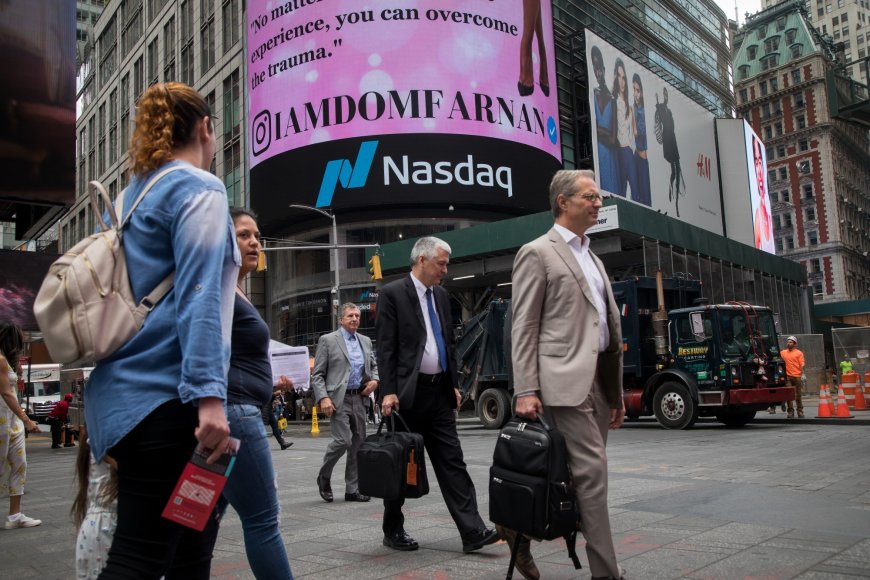Wall Street Braces for Slow Start Amid Lingering Concerns Over Interest Rates
Wall Street prepares for a subdued start as concerns over prolonged high interest rates persist. Investors monitor economic data and Federal Reserve statements for insights on market trends.

Today, Wall Street is gearing up for a mellow beginning, with ongoing worries about interest rates remaining higher than usual, causing the 10-year Treasury yield to stay robust. Investors are also keeping an eye on economic data and listening closely to Federal Reserve officials' statements set for release this week.
Last Friday saw the S&P 500 and the Nasdaq experiencing their most significant weekly percentage drop since March. This coincided with benchmark Treasury yields reaching multi-year highs, and investors absorbing the Federal Reserve's new, more cautious outlook.
As we approach the end of the September quarter, the Dow, along with the other two benchmark indexes, is heading for its first quarterly decline this year.
After the Federal Reserve recently chose to keep its key rate unchanged and hinted at a more prolonged restrictive policy, some policymakers are cautioning about potential further rate hikes, expressing doubts about whether the battle against inflation is over.
Concerns about the direction of interest rates, including the possibility of an increase by year-end and projections for fewer reductions in the following year, have led to the 10-year Treasury yield reaching its highest point in 16 years, affecting growth stocks negatively.
Before the market opened on Monday, Alphabet, Nvidia, Tesla, and Meta Platforms all felt some downward pressure, with losses ranging from 0.6% to 1.6%.
Throughout the week, investors will keep a close watch on data regarding durable goods, the Federal Reserve's favored inflation measure - the Personal Consumption Expenditures (PCE) price index for August, second-quarter GDP, and statements from Federal Reserve officials, including Chair Jerome Powell.
Thomas Martin, senior portfolio manager at GLOBALT Investments, remarked, "We're now in a phase where the impact from the Federal Reserve's policy tightening is beginning to take effect. This is when we really need to pay attention to those indicators."
According to CME's FedWatch tool, traders currently expect the benchmark rate to remain unchanged in November (74% confidence) and December (59% confidence), respectively.
Investors are also considering other factors, including elevated oil prices, the resumption of student loan payments in October, and the potential government shutdown if lawmakers fail to pass a budget by Sept. 30.
Martin added, "Given the various uncertainties and the fact that this month is traditionally considered one of the most challenging of the year, people are likely to proceed with caution."
As of 8:19 a.m. ET, Dow e-minis were down 72 points, or 0.21%, S&P 500 e-minis were down 12 points, or 0.28%, and Nasdaq 100 e-minis were down 48 points, or 0.32%.
Following a preliminary labor agreement between Hollywood's writers union and major studios on Sunday, media firms like Warner Bros Discovery, Paramount Global, Netflix, and Walt Disney saw gains ranging from 0.4% to 2%. This deal is anticipated to resolve one of two strikes that have brought most film and television production to a halt.
HP Inc experienced a 2.6% dip after Warren Buffett's Berkshire Hathaway sold nearly 4.8 million shares of the PC maker.
Footwear manufacturer Nike and sportswear retailer Foot Locker both saw declines of 1.6% and 2.6%, respectively, after Jefferies downgraded both stocks from "buy" to "hold."
U.S.-listed shares of Chinese firms experienced a dip ahead of a week-long holiday in the world's second-largest economy. Shares of Alibaba, PDD Holdings, Baidu, and JD.com fell between 1.6% and 3.2%.
Also Read: Stock Market Update: Markets Show Signs of Recovery After Fed's Signal































































